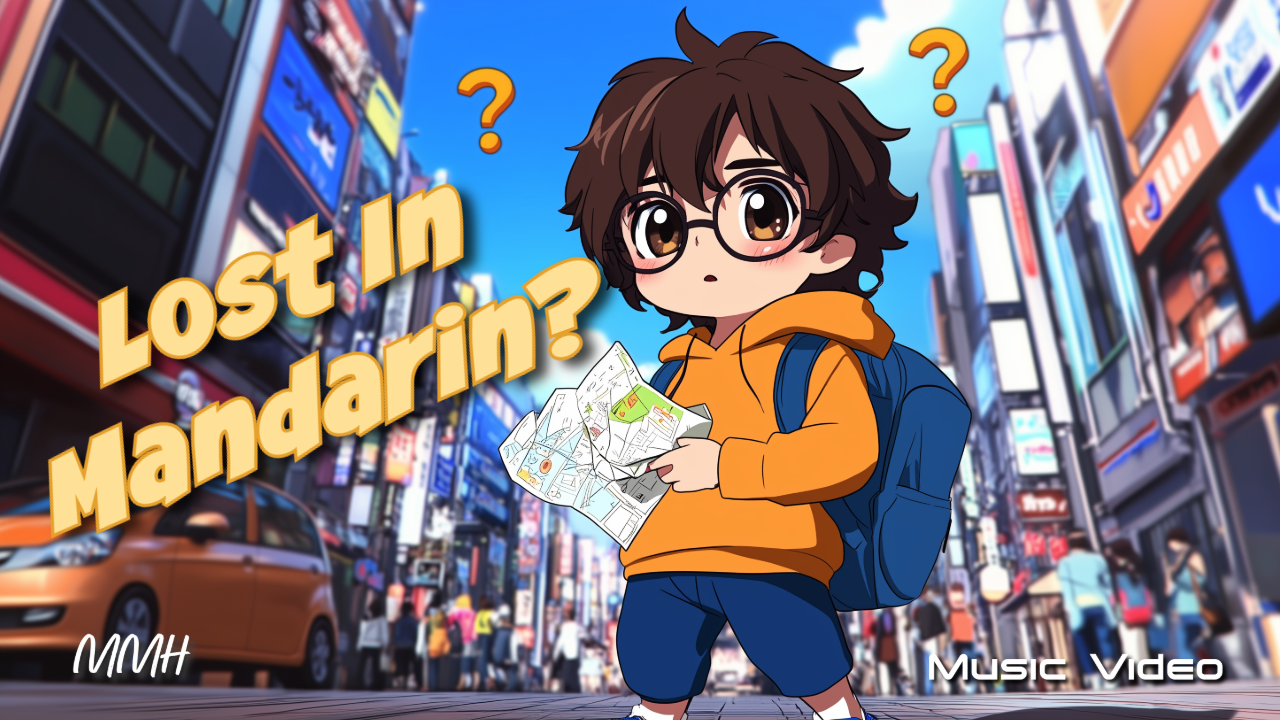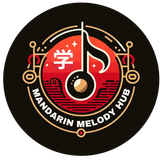Lost in Translation: Lost and Found Vocabulary

Master essential direction words and navigation phrases through this funky urban adventure
Originally released January 10, 2025
🎵 Watch & Listen
🎮 Practice with Interactive Flashcards
Master all the direction and navigation vocabulary from "Lost and Found"! Our interactive flashcard system helps you memorize essential phrases like "left or right," "go straight ahead," and "I'm lost" through spaced repetition and active recall.
→ Practice "Lost and Found" Flashcards
The Story Behind the Song
Ever been lost in a busy city, clutching a confusing map and trying to ask for directions in a language you barely speak? "Lost and Found" captures that universal experience of urban navigation gone hilariously wrong. Our adorable chibi protagonist wanders through crowded streets asking strangers for help, only to get turned around despite following directions, discover the bus stop is impossibly far away, and end up drenched in sweat from his urban odyssey. Just when he finally spots the subway station and makes it to the platform in triumph, the camera reveals a cute chibi girl standing nearby, holding a map and looking just as confused as he was at the beginning—the cycle continues!
This funky pop song with urban beats makes learning Mandarin direction vocabulary genuinely fun and memorable. Whether you're an HSK student preparing for exams, a traveler getting ready for your China trip, or just starting your Mandarin journey, you'll master essential navigation phrases like asking where places are, understanding directional instructions, and expressing gratitude when someone helps you find your way. The catchy chorus drilling "left or right" and "go straight ahead" will have these critical phrases stuck in your head long after the song ends.
"Lost and Found" stands out for combining practical, immediately useful vocabulary with an engaging narrative that every language learner can relate to. The song covers beginner-friendly directional words, polite question patterns for asking strangers for help, and the emotional vocabulary of feeling embarrassed or confused—all wrapped in an upbeat musical package that makes learning feel like entertainment rather than studying. By following our protagonist's journey from confused wandering to confident navigation, you'll build the language skills you need to actually explore Chinese-speaking cities with confidence.
Complete Song Lyrics
Verse 1
I'm in a busy city, where should I go?
My map's confusing, the streets feel so slow.
Excuse me, can you help me, please?
I just need to find the subway with ease.
{我|wǒ - I}{迷路|mí lù - get lost}{了|le - particle}{怎么办|zěn me bàn - what to do}? ({wǒ|我 - I} {mí lù|迷路 - get lost} {le|了 - particle} {zěn me bàn|怎么办 - what to do}?)
I'm lost, what should I do?
{街上|jiē shàng - on the street}{人|rén - people}{好多|hǎo duō - so many}{很|hěn - very}{混乱|hùn luàn - chaotic} ({jiē shàng|街上 - on the street} {rén|人 - people} {hǎo duō|好多 - so many} {hěn|很 - very} {hùn luàn|混乱 - chaotic})
The streets are crowded and chaotic
{请问|qǐng wèn - excuse me}{地铁站|dì tiě zhàn - subway station}{在|zài - at}{哪|nǎ - where}? ({qǐng wèn|请问 - excuse me} {dì tiě zhàn|地铁站 - subway station} {zài|在 - at} {nǎ|哪 - where}?)
Excuse me, where is the subway station?
{听|tīng - listen}{不|bù - not}{懂|dǒng - understand}?{哎呀|āi yā - oh no},{我|wǒ - I}{好|hǎo - so}{尴尬|gān gà - embarrassed}! ({tīng|听 - listen} {bù|不 - not} {dǒng|懂 - understand}?{āi yā|哎呀 - oh no},{wǒ|我 - I} {hǎo|好 - so} {gān gà|尴尬 - embarrassed}!)
Can't understand? Oh no, I'm so embarrassed!
Chorus
Left or right, where do I go?
{往|wǎng - toward}{左|zuǒ - left}{还是|hái shì - or}{往|wǎng - toward}{右|yòu - right}? ({wǎng|往 - toward} {zuǒ|左 - left} {hái shì|还是 - or} {wǎng|往 - toward} {yòu|右 - right}?)
Left or right?
Straight ahead, is it so?
{往|wǎng - toward}{前|qián - front}{走|zǒu - walk},{对|duì - correct}{不|bù - not}{对|duì - correct}? ({wǎng|往 - toward} {qián|前 - front} {zǒu|zǒu - walk},{duì|对 - correct} {bù|不 - not} {duì|对 - correct}?)
Go straight ahead, is that right?
I need to find my way today,
{今天|jīn tiān - today}{一定|yí dìng - must}{要|yào - want}{找到|zhǎo dào - find}{路|lù - way}! ({jīn tiān|今天 - today} {yí dìng|一定 - must} {yào|要 - want} {zhǎo dào|找到 - find} {lù|路 - way}!) I must find my way today!
Verse 2
They said, "Go straight," but I'm turning back,
The bus stop's missing, I've lost the track.
It's so far away, my feet are sore,
I'm sweating now—couldn't walk any more.
{有人|yǒu rén - someone}{说|shuō - say}{往|wǎng - toward}{前|qián - front}{走|zǒu - walk}, ({yǒu rén|有人 - someone} {shuō|说 - say} {wǎng|往 - toward} {qián|前 - front} {zǒu|zǒu - walk},)
Someone said to go straight ahead,
{可是|kě shì - but}{后来|hòu lái - later}{发现|fā xiàn - discover}{要|yào - need}{回头|huí tóu - turn back}。 ({kě shì|可是 - but} {hòu lái|后来 - later} {fā xiàn|发现 - discover} {yào|要 - need} {huí tóu|回头 - turn back}。)
But later discovered I needed to turn back.
{公交车站|gōng jiāo chē zhàn - bus stop}{真是|zhēn shì - really}{太|tài - too}{远|yuǎn - far}, ({gōng jiāo chē zhàn|公交车站 - bus stop} {zhēn shì|真是 - really} {tài|太 - too} {yuǎn|远 - far},)
The bus stop is really too far,
{走|zǒu - walk}{了|le - particle}{一路|yí lù - the whole way},{满头大汗|mǎn tóu dà hàn - drenched in sweat}。 ({zǒu|走 - walk} {le|了 - particle} {yí lù|一路 - the whole way},{mǎn tóu dà hàn|满头大汗 - drenched in sweat}。)
Walked the whole way, drenched in sweat.
Chorus
Left or right, where do I go?
{往|wǎng - toward}{左|zuǒ - left}{还是|hái shì - or}{往|wǎng - toward}{右|yòu - right}? ({wǎng|往 - toward} {zuǒ|左 - left} {hái shì|还是 - or} {wǎng|往 - toward} {yòu|右 - right}?)
Left or right?
Straight ahead, is it so?
{往|wǎng - toward}{前|qián - front}{走|zǒu - walk},{对|duì - correct}{不|bù - not}{对|duì - correct}? ({wǎng|往 - toward} {qián|前 - front} {zǒu|zǒu - walk},{duì|对 - correct} {bù|不 - not} {duì|对 - correct}?)
Go straight ahead, is that right?
I need to find my way today,
{今天|jīn tiān - today}{一定|yí dìng - must}{要|yào - want}{找到|zhǎo dào - find}{路|lù - way}! ({jīn tiān|今天 - today} {yí dìng|一定 - must} {yào|要 - want} {zhǎo dào|找到 - find} {lù|路 - way}!)
I must find my way today!
Bridge
{你|nǐ - you}{看|kàn - look}!{到|dào - arrive}{了|le - particle}!{就|jiù - just}{在|zài - at}{那边|nà biān - over there}! ({nǐ|你 - you} {kàn|看 - look}!{dào|到 - arrive} {le|了 - particle}!{jiù|就 - just} {zài|在 - at} {nà biān|那边 - over there}!)
Look! We're here! It's right over there!
Yes! I made it! Right over there!
{多谢|duō xiè - thank you}{你|nǐ - you},{真的|zhēn de - really}{谢谢|xiè xiè - thank you}。 ({duō xiè|多谢 - thank you} {nǐ|你 - you},{zhēn de|真的 - really} {xiè xiè|谢谢 - thank you}。)
Thank you so much, really thank you.
Thank you so much for showing you care!
Final Chorus
Left or right, now I know!
{往|wǎng - toward}{左|zuǒ - left}{还是|hái shì - or}{往|wǎng - toward}{右|yòu - right},{我|wǒ - I}{懂|dǒng - understand}{了|le - particle}! ({wǎng|往 - toward} {zuǒ|左 - left} {hái shì|还是 - or} {wǎng|往 - toward} {yòu|右 - right},{wǒ|我 - I} {dǒng|懂 - understand} {le|了 - particle}!)
Left or right, I understand now!
Walk straight ahead, take it slow.
{往|wǎng - toward}{前|qián - front}{走|zǒu - walk},{慢慢来|màn màn lái - take it slow}。 ({wǎng|往 - toward} {qián|前 - front} {zǒu|zǒu - walk},{màn màn lái|慢慢来 - take it slow}。)
Go straight ahead, take it slow.
I've found my way, and now I'll say,
{现在|xiàn zài - now}{我|wǒ - I}{认识|rèn shi - know}{路|lù - way},{可以|kě yǐ - can}{自己|zì jǐ - myself}{去|qù - go}! ({xiàn zài|现在 - now} {wǒ|我 - I} {rèn shi|认识 - know} {lù|路 - way},{kě yǐ|可以 - can} {zì jǐ|自己 - myself} {qù|去 - go}!)
Now I know the way, I can go by myself!
Getting lost was fun today!
{迷路|mí lù - get lost}{也|yě - also}{很|hěn - very}{好玩|hǎo wán - fun}! ({mí lù|迷路 - get lost} {yě|也 - also} {hěn|很 - very} {hǎo wán|好玩 - fun}!)
Getting lost was fun too!
Complete Vocabulary List
Master every Chinese word from this song with our comprehensive vocabulary breakdown, organized by HSK difficulty level for systematic learning.
Basic Vocabulary (HSK 1-2)
- {我|wǒ - I} ({wǒ|我 - I}) = I/me [HSK1]
- {在|zài - at} ({zài|在 - at}) = to be at/in [HSK1]
- {了|le - particle} ({le|了 - particle}) = aspect particle [HSK1]
- {怎么|zěn me - how} ({zěn me|怎么 - how}) = how [HSK1]
- {办|bàn - do} ({bàn|办 - do}) = to do, to handle [HSK2]
- {街|jiē - street} ({jiē|街 - street}) = street [HSK2]
- {上|shàng - on} ({shàng|上 - on}) = on, above [HSK1]
- {人|rén - person} ({rén|人 - person}) = person/people [HSK1]
- {好|hǎo - good} ({hǎo|好 - good}) = good, very [HSK1]
- {多|duō - many} ({duō|多 - many}) = many, much [HSK1]
- {很|hěn - very} ({hěn|很 - very}) = very [HSK1]
- {请|qǐng - please} ({qǐng|请 - please}) = please [HSK1]
- {问|wèn - ask} ({wèn|问 - ask}) = to ask [HSK2]
- {站|zhàn - station} ({zhàn|站 - station}) = station, stop [HSK3]
- {哪|nǎ - where} ({nǎ|哪 - where}) = where, which [HSK1]
- {听|tīng - listen} ({tīng|听 - listen}) = to listen, to hear [HSK1]
- {不|bù - not} ({bù|不 - not}) = not [HSK1]
- {懂|dǒng - understand} ({dǒng|懂 - understand}) = to understand [HSK2]
- {往|wǎng - toward} ({wǎng|往 - toward}) = toward, to [HSK2]
- {左|zuǒ - left} ({zuǒ|左 - left}) = left [HSK2]
- {还是|hái shì - or} ({hái|还 - still} {shì|是 - be}) = or [HSK3]
- {右|yòu - right} ({yòu|右 - right}) = right [HSK2]
- {前|qián - front} ({qián|前 - front}) = front, ahead [HSK1]
- {走|zǒu - walk} ({zǒu|走 - walk}) = to walk, to go [HSK2]
- {对|duì - correct} ({duì|对 - correct}) = correct, right [HSK2]
- {今天|jīn tiān - today} ({jīn|今 - present} {tiān|天 - day}) = today [HSK1]
- {要|yào - want} ({yào|要 - want}) = to want, must [HSK1]
- {找|zhǎo - find} ({zhǎo|找 - find}) = to find, to look for [HSK2]
- {到|dào - arrive} ({dào|到 - arrive}) = to arrive, to reach [HSK2]
- {路|lù - road} ({lù|路 - road}) = road, way [HSK2]
- {有|yǒu - have} ({yǒu|有 - have}) = to have, there is [HSK1]
- {说|shuō - say} ({shuō|说 - say}) = to say, to speak [HSK1]
- {可是|kě shì - but} ({kě|可 - can} {shì|是 - be}) = but, however [HSK2]
- {要|yào - need} ({yào|要 - need}) = to need, must [HSK1]
- {真|zhēn - really} ({zhēn|真 - really}) = really, truly [HSK2]
- {是|shì - be} ({shì|是 - be}) = to be [HSK1]
- {太|tài - too} ({tài|太 - too}) = too, extremely [HSK1]
- {远|yuǎn - far} ({yuǎn|远 - far}) = far [HSK2]
- {你|nǐ - you} ({nǐ|你 - you}) = you [HSK1]
- {看|kàn - look} ({kàn|看 - look}) = to look, to see [HSK1]
- {就|jiù - just} ({jiù|就 - just}) = just, then [HSK2]
- {谢|xiè - thank} ({xiè|谢 - thank}) = to thank [HSK1]
- {的|de - particle} ({de|的 - particle}) = possessive particle [HSK1]
- {现在|xiàn zài - now} ({xiàn|现 - present} {zài|在 - at}) = now [HSK1]
- {认识|rèn shi - know} ({rèn|认 - recognize} {shi|识 - know}) = to know, to recognize [HSK1]
- {可以|kě yǐ - can} ({kě|可 - can} {yǐ|以 - use}) = can, may [HSK2]
- {去|qù - go} ({qù|去 - go}) = to go [HSK1]
- {也|yě - also} ({yě|也 - also}) = also, too [HSK1]
- {玩|wán - fun} ({wán|玩 - fun}) = fun, to play [HSK2]
Intermediate Vocabulary (HSK 3-4)
- {迷路|mí lù - get lost} ({mí|迷 - confused} {lù|路 - road}) = to get lost [HSK4]
- {混乱|hùn luàn - chaotic} ({hùn|混 - mixed} {luàn|乱 - chaos}) = chaotic, messy [HSK4]
- {地铁|dì tiě - subway} ({dì|地 - ground} {tiě|铁 - iron}) = subway [HSK3]
- {一定|yí dìng - must} ({yí|一 - one} {dìng|定 - fixed}) = must, certainly [HSK3]
- {后来|hòu lái - later} ({hòu|后 - after} {lái|来 - come}) = later, afterwards [HSK3]
- {发现|fā xiàn - discover} ({fā|发 - emit} {xiàn|现 - appear}) = to discover, to find [HSK3]
- {回头|huí tóu - turn back} ({huí|回 - return} {tóu|头 - head}) = to turn back [HSK4]
- {公交车|gōng jiāo chē - bus} ({gōng|公 - public} {jiāo|交 - transport} {chē|车 - vehicle}) = bus [HSK3]
- {一路|yí lù - the whole way} ({yí|一 - one} {lù|路 - road}) = the whole way, all the way [HSK4]
- {那边|nà biān - over there} ({nà|那 - that} {biān|边 - side}) = over there [HSK3]
- {真的|zhēn de - really} ({zhēn|真 - true} {de|的 - particle}) = really, truly [HSK3]
- {慢慢|màn màn - slowly} ({màn|慢 - slow} {màn|慢 - slow}) = slowly [HSK3]
- {来|lái - come} ({lái|来 - come}) = to come [HSK1]
- {自己|zì jǐ - oneself} ({zì|自 - self} {jǐ|己 - oneself}) = oneself, self [HSK3]
Advanced/Specialized Vocabulary (HSK 5+ or non-HSK)
- {怎么办|zěn me bàn - what to do} ({zěn me|怎么 - how} {bàn|办 - handle}) = what to do, what should I do [HSK4]
- {街上|jiē shàng - on the street} ({jiē|街 - street} {shàng|上 - on}) = on the street [Phrase]
- {好多|hǎo duō - so many} ({hǎo|好 - very} {duō|多 - many}) = so many, a lot [HSK3]
- {请问|qǐng wèn - excuse me} ({qǐng|请 - please} {wèn|问 - ask}) = excuse me (polite way to ask) [HSK2]
- {地铁站|dì tiě zhàn - subway station} ({dì tiě|地铁 - subway} {zhàn|站 - station}) = subway station [Phrase]
- {听不懂|tīng bù dǒng - can't understand} ({tīng|听 - hear} {bù|不 - not} {dǒng|懂 - understand}) = can't understand [Phrase]
- {哎呀|āi yā - oh no} ({āi yā|哎呀 - oh no}) = oh no, oh dear [HSK2]
- {尴尬|gān gà - embarrassed} ({gān|尴 - embarrassed} {gà|尬 - awkward}) = embarrassed, awkward [HSK5]
- {往左|wǎng zuǒ - toward left} ({wǎng|往 - toward} {zuǒ|左 - left}) = to the left [Phrase]
- {往右|wǎng yòu - toward right} ({wǎng|往 - toward} {yòu|右 - right}) = to the right [Phrase]
- {往前走|wǎng qián zǒu - go straight} ({wǎng|往 - toward} {qián|前 - front} {zǒu|走 - walk}) = go straight ahead [Phrase]
- {对不对|duì bù duì - right or not} ({duì|对 - correct} {bù|不 - not} {duì|对 - correct}) = is that right?, correct or not [Phrase]
- {找到|zhǎo dào - find} ({zhǎo|找 - seek} {dào|到 - arrive}) = to find (successfully) [HSK3]
- {有人|yǒu rén - someone} ({yǒu|有 - have} {rén|人 - person}) = someone [Phrase]
- {公交车站|gōng jiāo chē zhàn - bus stop} ({gōng jiāo chē|公交车 - bus} {zhàn|站 - station}) = bus stop [Phrase]
- {真是|zhēn shì - really is} ({zhēn|真 - really} {shì|是 - be}) = really is [Phrase]
- {走了|zǒu le - walked} ({zǒu|走 - walk} {le|了 - particle}) = walked [Phrase]
- {满头大汗|mǎn tóu dà hàn - drenched in sweat} ({mǎn|满 - full} {tóu|头 - head} {dà|大 - big} {hàn|汗 - sweat}) = drenched in sweat [Idiom]
- {你看|nǐ kàn - look} ({nǐ|你 - you} {kàn|看 - look}) = look, you see [Phrase]
- {到了|dào le - arrived} ({dào|到 - arrive} {le|了 - particle}) = arrived [Phrase]
- {多谢|duō xiè - thank you} ({duō|多 - much} {xiè|谢 - thank}) = thank you very much [HSK3]
- {谢谢|xiè xiè - thank you} ({xiè|谢 - thank} {xiè|谢 - thank}) = thank you [HSK1]
- {我懂了|wǒ dǒng le - I understand} ({wǒ|我 - I} {dǒng|懂 - understand} {le|了 - particle}) = I understand now [Phrase]
- {慢慢来|màn màn lái - take it slow} ({màn màn|慢慢 - slowly} {lái|来 - come}) = take it slow, take your time [Phrase]
- {认识路|rèn shi lù - know the way} ({rèn shi|认识 - know} {lù|路 - road}) = to know the way [Phrase]
- {迷路|mí lù - getting lost} ({mí|迷 - confused} {lù|路 - road}) = getting lost [HSK4]
- {好玩|hǎo wán - fun} ({hǎo|好 - good} {wán|玩 - play}) = fun, interesting [HSK2]
Line-by-Line Analysis
Understanding the grammar and structure behind every line helps you build strong foundational knowledge for natural Chinese expression.
Verse 1
{我|wǒ - I}{迷路|mí lù - get lost}{了|le - particle}{怎么办|zěn me bàn - what to do}? ({wǒ|我 - I} {mí lù|迷路 - get lost} {le|了 - particle} {zěn me bàn|怎么办 - what to do}?)
- Grammar: 了 (le) marks completed action; 怎么办 asks "what should I do?"
- Key Point: 迷路了 (mí lù le) means "got lost" - 了 indicates the action already happened
- Structure: Subject + Verb + 了 + Question phrase
{街上|jiē shàng - on the street}{人|rén - people}{好多|hǎo duō - so many}{很|hěn - very}{混乱|hùn luàn - chaotic} ({jiē shàng|街上 - on the street} {rén|人 - people} {hǎo duō|好多 - so many} {hěn|很 - very} {hùn luàn|混乱 - chaotic})
- Grammar: 好多 means "so many" (好 intensifies 多); 很 + adjective pattern
- Key Point: 街上 means "on the street" - location + 上 indicates position
- Structure: Location + Noun + Quantity + Adverb + Adjective
{请问|qǐng wèn - excuse me}{地铁站|dì tiě zhàn - subway station}{在|zài - at}{哪|nǎ - where}? ({qǐng wèn|请问 - excuse me} {dì tiě zhàn|地铁站 - subway station} {zài|在 - at} {nǎ|哪 - where}?)
- Grammar: 请问 is polite way to start questions; 在哪 asks location
- Key Point: Standard pattern for asking "where is X?" = X + 在哪?
- Structure: Polite opener + Subject + 在 + Question word
{听|tīng - listen}{不|bù - not}{懂|dǒng - understand}?{哎呀|āi yā - oh no},{我|wǒ - I}{好|hǎo - so}{尴尬|gān gà - embarrassed}! ({tīng|听 - listen} {bù|不 - not} {dǒng|懂 - understand}?{āi yā|哎呀 - oh no},{wǒ|我 - I} {hǎo|好 - so} {gān gà|尴尬 - embarrassed}!)
- Grammar: 听不懂 uses potential complement 不 between verb and complement
- Key Point: 好 + adjective means "so + adjective" (intensifier)
- Structure: Verb + 不 + Complement (shows inability)
Chorus
{往|wǎng - toward}{左|zuǒ - left}{还是|hái shì - or}{往|wǎng - toward}{右|yòu - right}? ({wǎng|往 - toward} {zuǒ|左 - left} {hái shì|还是 - or} {wǎng|往 - toward} {yòu|右 - right}?)
- Grammar: 还是 connects alternatives in questions (or)
- Key Point: 往 + direction indicates movement toward that direction
- Structure: 往 + Direction + 还是 + 往 + Direction (choice question)
{往|wǎng - toward}{前|qián - front}{走|zǒu - walk},{对|duì - correct}{不|bù - not}{对|duì - correct}? ({wǎng|往 - toward} {qián|前 - front} {zǒu|zǒu - walk},{duì|对 - correct} {bù|不 - not} {duì|对 - correct}?)
- Grammar: 对不对 creates yes/no question asking for confirmation
- Key Point: 往前走 is common direction phrase meaning "go straight"
- Structure: Statement + 对不对? (confirmation question pattern)
{今天|jīn tiān - today}{一定|yí dìng - must}{要|yào - want}{找到|zhǎo dào - find}{路|lù - way}! ({jīn tiān|今天 - today} {yí dìng|一定 - must} {yào|要 - want} {zhǎo dào|找到 - find} {lù|路 - way}!)
- Grammar: 一定要 expresses strong determination (must)
- Key Point: 找到 uses resultative complement 到 showing successful completion
- Structure: Time + 一定要 + Verb + Object (emphatic determination)
Verse 2
{有人|yǒu rén - someone}{说|shuō - say}{往|wǎng - toward}{前|qián - front}{走|zǒu - walk}, ({yǒu rén|有人 - someone} {shuō|说 - say} {wǎng|往 - toward} {qián|前 - front} {zǒu|zǒu - walk},)
- Grammar: 有人 means "someone" (literally "have person")
- Key Point: 说 introduces reported speech - what someone said
- Structure: 有人 + 说 + [what they said]
{可是|kě shì - but}{后来|hòu lái - later}{发现|fā xiàn - discover}{要|yào - need}{回头|huí tóu - turn back}。 ({kě shì|可是 - but} {hòu lái|后来 - later} {fā xiàn|发现 - discover} {yào|要 - need} {huí tóu|回头 - turn back}。)
- Grammar: 可是 introduces contrast (but); 后来 marks later time
- Key Point: 发现 + clause shows realization of new information
- Structure: 可是 + Time word + Discovery verb + Result
{公交车站|gōng jiāo chē zhàn - bus stop}{真是|zhēn shì - really}{太|tài - too}{远|yuǎn - far}, ({gōng jiāo chē zhàn|公交车站 - bus stop} {zhēn shì|真是 - really} {tài|太 - too} {yuǎn|远 - far},)
- Grammar: 真是 emphasizes truth; 太 + adjective means "too + adjective"
- Key Point: 太远 expresses complaint about excessive distance
- Structure: Subject + 真是 + 太 + Adjective (emphatic complaint)
{走|zǒu - walk}{了|le - particle}{一路|yí lù - the whole way},{满头大汗|mǎn tóu dà hàn - drenched in sweat}。 ({zǒu|走 - walk} {le|了 - particle} {yí lù|一路 - the whole way},{mǎn tóu dà hàn|满头大汗 - drenched in sweat}。)
- Grammar: 走了一路 means "walked the whole way" - 了 shows completion
- Key Point: 满头大汗 is a vivid idiom describing being covered in sweat
- Structure: Verb + 了 + Duration/Extent + Result description
Bridge
{你|nǐ - you}{看|kàn - look}!{到|dào - arrive}{了|le - particle}!{就|jiù - just}{在|zài - at}{那边|nà biān - over there}! ({nǐ|你 - you} {kàn|看 - look}!{dào|到 - arrive} {le|了 - particle}!{jiù|就 - just} {zài|在 - at} {nà biān|那边 - over there}!)
- Grammar: 你看 gets attention; 到了 shows arrival; 就在 means "right at"
- Key Point: Exclamatory tone with multiple !creates excitement
- Structure: Attention getter + Achievement + Location (excited announcement)
{多谢|duō xiè - thank you}{你|nǐ - you},{真的|zhēn de - really}{谢谢|xiè xiè - thank you}。 ({duō xiè|多谢 - thank you} {nǐ|你 - you},{zhēn de|真的 - really} {xiè xiè|谢谢 - thank you}。)
- Grammar: 多谢 is more formal than 谢谢; 真的 adds sincerity
- Key Point: Repeating thanks (多谢 + 谢谢) shows deep gratitude
- Structure: Formal thanks + Object + Sincerity marker + Casual thanks
Final Chorus
{往|wǎng - toward}{左|zuǒ - left}{还是|hái shì - or}{往|wǎng - toward}{右|yòu - right},{我|wǒ - I}{懂|dǒng - understand}{了|le - particle}! ({wǎng|往 - toward} {zuǒ|左 - left} {hái shì|还是 - or} {wǎng|往 - toward} {yòu|右 - right},{wǒ|我 - I} {dǒng|懂 - understand} {le|了 - particle}!)
- Grammar: 懂了 shows change of state - now understands (didn't before)
- Key Point: 了 after 懂 indicates newly acquired understanding
- Structure: Same question phrase + Realization statement (shows progress)
{往|wǎng - toward}{前|qián - front}{走|zǒu - walk},{慢慢来|màn màn lái - take it slow}。 ({wǎng|往 - toward} {qián|前 - front} {zǒu|zǒu - walk},{màn màn lái|慢慢来 - take it slow}。)
- Grammar: 慢慢来 is encouraging phrase meaning "take your time"
- Key Point: Reduplication of 慢 (màn màn) softens and emphasizes gradualness
- Structure: Direction instruction + Encouragement phrase
{现在|xiàn zài - now}{我|wǒ - I}{认识|rèn shi - know}{路|lù - way},{可以|kě yǐ - can}{自己|zì jǐ - myself}{去|qù - go}! ({xiàn zài|现在 - now} {wǒ|我 - I} {rèn shi|认识 - know} {lù|路 - way},{kě yǐ|可以 - can} {zì jǐ|自己 - myself} {qù|去 - go}!)
- Grammar: 认识路 means "know the way"; 可以 expresses ability
- Key Point: 自己 emphasizes independence - "by myself"
- Structure: Time + Achievement statement + Ability statement (shows growth)
{迷路|mí lù - get lost}{也|yě - also}{很|hěn - very}{好玩|hǎo wán - fun}! ({mí lù|迷路 - get lost} {yě|也 - also} {hěn|很 - very} {hǎo wán|好玩 - fun}!)
- Grammar: 也 adds unexpected element; 很好玩 means "very fun"
- Key Point: Positive reframe - finding silver lining in getting lost
- Structure: Subject + 也 + 很 + Adjective (surprising positive statement)
Advanced Grammar Points
These key grammar patterns from the song will elevate your Chinese expression and help you sound more natural.
1. The 了 (le) Aspect Particle for Completed Actions
- Pattern: {Verb|verb} + {了|le - particle} ({Verb le|Verb了 - completed action})
- Function: Marks that an action has been completed or a new situation has emerged
- Example: {我|wǒ - I}{迷路|mí lù - get lost}{了|le - particle} ({wǒ|我 - I} {mí lù|迷路 - get lost} {le|了 - particle}) = I got lost (it already happened)
- Usage: Essential for past events; common in spoken Chinese; can also indicate change of state
2. Potential Complements with 不 (bù)
- Pattern: {Verb|verb} + {不|bù - not} + {Complement|complement} ({Verb bù Complement|Verb不Complement - cannot})
- Function: Expresses inability to achieve the result of an action
- Example: {听|tīng - listen}{不|bù - not}{懂|dǒng - understand} ({tīng|听 - listen} {bù|不 - not} {dǒng|懂 - understand}) = can't understand (by listening)
- Usage: Very common pattern; shows physical or circumstantial inability; contrast with 听得懂 (can understand)
3. The 还是 (hái shì) Choice Question Pattern
- Pattern: {Option A|option A} + {还是|hái shì - or} + {Option B|option B} ({Option A hái shì Option B|Option A还是Option B - A or B?})
- Function: Presents two or more alternatives in a question requiring a choice
- Example: {往|wǎng - toward}{左|zuǒ - left}{还是|hái shì - or}{往|wǎng - toward}{右|yòu - right}? ({wǎng|往 - toward} {zuǒ|左 - left} {hái shì|还是 - or} {wǎng|往 - toward} {yòu|右 - right}?) = Left or right?
- Usage: Used in questions only; forces listener to choose between options; very common in daily conversation
4. The 一定要 (yí dìng yào) Strong Determination Pattern
- Pattern: {一定|yí dìng - must} + {要|yào - want} + {Verb|verb} ({yí dìng yào Verb|一定要Verb - must do})
- Function: Expresses strong determination, necessity, or obligation
- Example: {今天|jīn tiān - today}{一定|yí dìng - must}{要|yào - want}{找到|zhǎo dào - find}{路|lù - way} ({jīn tiān|今天 - today} {yí dìng|一定 - must} {yào|要 - want} {zhǎo dào|找到 - find} {lù|路 - way}) = I must find my way today
- Usage: Shows strong resolve; more emphatic than just 要; common in promises and commitments
5. Resultative Complements with 到 (dào)
- Pattern: {Verb|verb} + {到|dào - arrive} ({Verb dào|Verb到 - successfully achieve})
- Function: Indicates successful completion of an action or achievement of a goal
- Example: {找|zhǎo - look for}{到|dào - arrive} ({zhǎo|找 - look for} {dào|到 - arrive}) = to find (successfully)
- Usage: 到 shows the action achieved its intended result; contrast with just 找 (to search, may not find)
6. The 对不对 (duì bù duì) Confirmation Question
- Pattern: {Statement|statement},{对|duì - correct}{不|bù - not}{对|duì - correct}? ({Statement, duì bù duì|Statement,对不对? - right?})
- Function: Asks for confirmation or agreement with a statement
- Example: {往|wǎng - toward}{前|qián - front}{走|zǒu - walk},{对|duì - correct}{不|bù - not}{对|duì - correct}? ({wǎng|往 - toward} {qián|前 - front} {zǒu|zǒu - walk},{duì|对 - correct} {bù|不 - not} {duì|对 - correct}?) = Go straight, right?
- Usage: Shows uncertainty; seeks validation; very natural in conversation when unsure
7. The 也 (yě) Pattern for Surprising Additions
- Pattern: {Subject|subject} + {也|yě - also} + {Predicate|predicate} ({Subject yě Predicate|Subject也Predicate - even/also})
- Function: Adds an unexpected or surprising element to the statement
- Example: {迷路|mí lù - get lost}{也|yě - also}{很|hěn - very}{好玩|hǎo wán - fun} ({mí lù|迷路 - get lost} {yě|也 - also} {hěn|很 - very} {hǎo wán|好玩 - fun}) = Getting lost is also fun
- Usage: Creates positive reframe; shows silver lining; common in philosophical or optimistic statements
Thematic Vocabulary Groups
Understanding related vocabulary together helps you build semantic networks for faster recall and more natural expression.
Directional Movement Vocabulary
Essential words for giving and following directions:
- {往|wǎng - toward} ({wǎng|往 - toward}) = toward, in the direction of
- {左|zuǒ - left} ({zuǒ|左 - left}) = left
- {右|yòu - right} ({yòu|右 - right}) = right
- {前|qián - front} ({qián|前 - front}) = front, ahead
- {后|hòu - back} ({hòu|后 - back}) = back, behind
- {走|zǒu - walk} ({zǒu|走 - walk}) = to walk, to go
- {回头|huí tóu - turn back} ({huí|回 - return} {tóu|头 - head}) = to turn back, return
- {一路|yí lù - all the way} ({yí|一 - one} {lù|路 - road}) = all the way, the whole journey
Navigation & Location Vocabulary
Key terms for finding your way and asking about places:
- {地铁站|dì tiě zhàn - subway station} ({dì tiě|地铁 - subway} {zhàn|站 - station}) = subway station
- {公交车站|gōng jiāo chē zhàn - bus stop} ({gōng jiāo chē|公交车 - bus} {zhàn|站 - station}) = bus stop
- {街|jiē - street} ({jiē|街 - street}) = street
- {路|lù - road} ({lù|路 - road}) = road, way, route
- {那边|nà biān - over there} ({nà|那 - that} {biān|边 - side}) = over there
- {在|zài - at} ({zài|在 - at}) = to be at/in (location)
- {哪|nǎ - where} ({nǎ|哪 - where}) = where, which
Getting Lost & Finding Your Way
Vocabulary for the universal experience of being lost:
- {迷路|mí lù - get lost} ({mí|迷 - confused} {lù|路 - road}) = to get lost
- {找|zhǎo - find} ({zhǎo|找 - find}) = to look for, to search
- {找到|zhǎo dào - find successfully} ({zhǎo|找 - look for} {dào|到 - arrive}) = to find (successfully)
- {认识路|rèn shi lù - know the way} ({rèn shi|认识 - know} {lù|路 - road}) = to know the way
- {发现|fā xiàn - discover} ({fā|发 - emit} {xiàn|现 - appear}) = to discover, realize
- {到|dào - arrive} ({dào|到 - arrive}) = to arrive, reach
- {怎么办|zěn me bàn - what to do} ({zěn me|怎么 - how} {bàn|办 - handle}) = what should I do?
Polite Communication for Asking Help
Essential phrases for politely asking strangers for assistance:
- {请问|qǐng wèn - excuse me} ({qǐng|请 - please} {wèn|问 - ask}) = excuse me (to ask a question)
- {谢谢|xiè xiè - thank you} ({xiè|谢 - thank} {xiè|谢 - thank}) = thank you
- {多谢|duō xiè - thank you very much} ({duō|多 - much} {xiè|谢 - thank}) = thank you very much
- {真的|zhēn de - really} ({zhēn|真 - true} {de|的 - particle}) = really, truly
- {听|tīng - listen} ({tīng|听 - listen}) = to listen, to hear
- {懂|dǒng - understand} ({dǒng|懂 - understand}) = to understand
- {说|shuō - say} ({shuō|说 - say}) = to say, speak
Emotional States When Lost
Words for expressing feelings during navigation challenges:
- {尴尬|gān gà - embarrassed} ({gān|尴 - embarrassed} {gà|尬 - awkward}) = embarrassed, awkward
- {混乱|hùn luàn - chaotic} ({hùn|混 - mixed} {luàn|乱 - chaos}) = chaotic, confused, messy
- {哎呀|āi yā - oh no} ({āi yā|哎呀 - oh no}) = oh no, oh dear (exclamation)
- {好玩|hǎo wán - fun} ({hǎo|好 - good} {wán|玩 - play}) = fun, interesting, amusing
- {满头大汗|mǎn tóu dà hàn - drenched in sweat} ({mǎn|满 - full} {tóu|头 - head} {dà|大 - big} {hàn|汗 - sweat}) = drenched in sweat (idiom)
Distance & Extent Expressions
Vocabulary for describing how far things are:
- {太|tài - too} ({tài|太 - too}) = too (excessive)
- {远|yuǎn - far} ({yuǎn|远 - far}) = far
- {很|hěn - very} ({hěn|很 - very}) = very
- {好|hǎo - quite} ({hǎo|好 - quite}) = quite, very (intensifier)
- {好多|hǎo duō - so many} ({hǎo|好 - very} {duō|多 - many}) = so many, a lot
- {一路|yí lù - all the way} ({yí|一 - one} {lù|路 - road}) = all the way, the whole journey
- {慢慢|màn màn - slowly} ({màn|慢 - slow} {màn|慢 - slow}) = slowly, gradually
Cultural Notes
Asking for Directions in Chinese Culture
In Chinese-speaking regions, asking strangers for directions is a common and socially accepted practice. The song captures several culturally important aspects of this interaction:
Politeness matters: The use of {请问|qǐng wèn - excuse me} ({qǐng|请 - please} {wèn|问 - ask}) before asking questions is essential. This polite opener shows respect and significantly increases the likelihood of receiving helpful responses. Direct questions without this politeness marker can seem abrupt or rude.
Gratitude is repeated: Notice how the song includes both {多谢|duō xiè - thank you very much} ({duō|多 - much} {xiè|谢 - thank}) and {谢谢|xiè xiè - thank you} ({xiè|谢 - thank} {xiè|谢 - thank}). In Chinese culture, repeating or intensifying expressions of gratitude shows genuine appreciation and good manners. It's common to thank someone multiple times, especially when they've gone out of their way to help.
Navigation challenges in Chinese cities: Major Chinese cities can be genuinely confusing for newcomers. Street layouts often don't follow grid patterns, landmark-based directions are more common than street addresses, and even with GPS, finding specific locations (especially subway entrances) can be challenging. The song's scenario of getting turned around despite following directions resonates with anyone who has navigated a Chinese city.
The subway culture: The {地铁|dì tiě - subway} ({dì|地 - ground} {tiě|铁 - iron}) is the primary transportation method in major Chinese cities. Subway stations are ubiquitous but sometimes hidden, making "where is the subway station?" one of the most common questions travelers ask. Understanding directional vocabulary is essential for using public transportation effectively.
🎮 Practice with Interactive Flashcards
Ready to master all this vocabulary? Our interactive flashcard system uses spaced repetition to help you memorize every word from "Lost and Found."
→ Practice "Lost and Found" Flashcards
🎵 Coming Soon
We're constantly creating new songs to help you learn Mandarin through music! Each song focuses on practical vocabulary and natural expressions you can use in real conversations.
What's Next?
Now that you've learned essential direction vocabulary through "Lost and Found," you're ready to navigate Chinese-speaking cities with confidence! These phrases and patterns will serve you well whether you're asking locals for help, following GPS directions in Chinese, or just trying to find your way around.
Keep practicing with the song, use the flashcards to reinforce your memory, and don't be afraid to actually use these phrases in real situations. Remember: {迷路|mí lù - getting lost}{也|yě - also}{很|hěn - very}{好玩|hǎo wán - fun} ({mí lù|迷路 - getting lost} {yě|也 - also} {hěn|很 - very} {hǎo wán|好玩 - fun}) - getting lost can be fun too! Some of the best travel experiences come from taking a wrong turn and discovering something unexpected.
What topic would you like to learn about in our next song? Share your ideas in the comments below! 🎵




